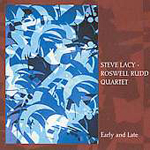|
|
 |
Dusted Reviews
Artist: Steve Lacy-Roswell Rudd Quartet Album: Early and Late Label: Cuneiform Review date: Aug. 9, 2007 |

|
|
|
 |
Give Steve Lacy credit – he did not shrink from the implications of his own observations. In a 1963 interview for Downbeat (reprinted 43 years later in Conversations), the soprano saxophonist lamented that pianist Thelonious Monk’s recordings suffered from insufficient rehearsal. “It seemed there wasn’t a strong enough relationship between the improvisations and the piece itself.” Lacy’s solution, already in action at the time of the interview, was to make Monk’s work his own until it became a way of life. In 1960, he and trombonist Roswell Rudd, who had already played together in traditional Dixieland ensembles, formed a piano-less quartet for four years that almost exclusively played Monk. The band had a terrible time finding gigs, and its sole recording – a live tape from a coffeehouse gig called School Days (Hatology) – didn’t come out until a dozen years after the band’s demise. But the two men reunited periodically right up to Lacy’s death in 2004. This double CD releases nearly two hours of music recorded during their 1999 North American tour and a 2002 gig at Iridium in New York, and concludes with the first studio material released by the original School Days combo.
It’s tempting to riff on Early and Late’s historical significance, or wax sentimental about how much Lacy is missed; permit me to get concrete and say that this is a really great album, one of the best jazz releases I’ve heard this year. It shows that despite a half-century of shared history, their combustible chemistry did not dull into mere cordiality. Because Rudd simply joined Lacy's working trio, which recorded quite prolifically on its own, it's not hard to check against the band's other recordings and see warmth and spirit that the trombonist brought to their music. Rudd's an old showbiz card at heart; Lacy and band sound quite happy to join him around the campfire of good humor.
Consider “Blinks,” which was recorded in Tucson. A locomotive whistle blows in the distance; in response, Rudd's solo detours through "Night Train," and Lacy works some train toots into his own solo. Listen to the way the horns swoop in together after Jean-Jacques Avenel’s iridescent introduction to “Bone,” then egg each other on while drummer John Betsch keeps the energy at a boil. By contrast the original School Days pieces, which were recorded as demos in 1962, are much more pithy, but the energy and humor are already there. Denis Charles is a very different drummer than Betsch, with a lighter touch, and Bob Cunningham sticks mainly to walking lines. But the brothers in brass take the curves on “Think of One,” two takes of “Eronel,” and Cecil Taylor’s “Tune 2” like local drivers bombing around a narrow mountain road, taking the curves at apparently fatal velocity without letting the wheels leave the gravel. They must have been practicing.
By Bill Meyer
|







